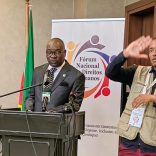Mozambique president to undertake 6 state visits in 2026 – Canada, Botswana, Angola, Russia, ...
All in readiness for municipal elections – AIM report

Felisberto Naife. File photo: Notícias
ll the ballot papers, ballot boxes and other materials for the Wednesday municipal elections, printed in South Africa, have now been transported to the 53 Mozambican municipalities, according to Felisberto Naife, the general director of the Electoral Administration Technical Secretariat (STAE).
Speaking at a Maputo press conference on Monday, Naife added that the money was available to pay allowances to all polling station staff (MMVs), and to buy a snack, costing 200 meticais (about 3.4 US dollars) to each of them, including those appointed by the political parties.
The training of the MMVs was completed last Friday and STAE is now hiring 38,203 of the 43,300 people trained. There are 5,459 polling stations, and each should have seven MMVs. Of these, four are recruited by STAE, and three are appointed by the political parties represented in parliament – the ruling Frelimo Party, the former rebel movement Renamo, and the Mozambique Democratic Movement MDM.
Naife believed the three parties were able to provide their quota of MMVs – at least none of them had complained that they were unable to find enough people.
He warned that the law bans anyone from wearing party emblems or clothing inside a polling station. Voters are also banned from using cameras or the camera function on their cell phones inside polling stations.
This is because of the demand raised in the past that voters, particularly public servants, should prove who they voted for. Frelimo has been accused of making this demand, to check the loyalty of public employees. This has now become impossible, and is a further check on the secrecy of the ballot.
Naife stressed that the law also states that once they have voted, citizens must leave the polling station. Although both Renamo and the MDM voted in parliament for the law containing this provision, senior members of both parties have, over the past few days, called lon their supporters to stay at the polling stations “to protect the vote”.
Naife pointed out that there are already guarantees in the law against fraud. Not only does each of the main parties have a representative on the staff at each polling station, but they can also appoint polling station monitors, who are entitled to ask questions about the proceedings, and to receive a copy of the polling station results sheet. If they note anything they consider irregular they are entitled to make a complaint, and the polling station chairperson is legally obliged to take down that complaint in writing.
In addition, a large number of election observers have been accredited – over 5,000 Mozambican observers, and about 500 foreign observers.
Asked about the allegations by the interim coordinator of the Renamo Political Commission, Ossufo Momade, that an enormous fraud is being prepared whereby Frelimo will bus in to the municipalities people from outside the municipal areas, and even foreign citizens from Zimbabwe and South Africa, Naife insisted that only people registered to vote in the municipalities will be allowed to vote.
The polling stations are in the same places as the voter registration sites. Voters thus simply return to the places (normally schools) where they registered. Those who are not registered cannot vote.
Naife stressed that allegations alone are never sufficient. People making allegations “need to provide evidence to help the electoral bodies”.
Renamo made similar claims immediately prior to the mayoral by-election in the northern city of Nampula in March. The late Renamo leader Afonso Dhlakama claimed that busloads of Frelimo voters were being ferried to Nampula from as far away as Maputo. But nobody else saw an enormous fleet of Frelimo bases, and the Renamo candidate, Paul Vahanle, won the election.












Leave a Reply
Be the First to Comment!
You must be logged in to post a comment.
You must be logged in to post a comment.